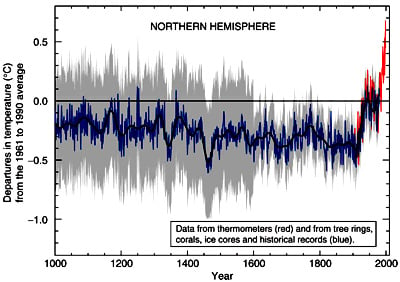This article is more than 1 year old
McIntyre: Climate policy crippled by pointless feel-good gestures
CO2 is rising, so let's get busy with cheaper-than-coal low-carbon energy
Disasters, climate extremes and how we've adapted to cope over the years
A climate extreme is not the same thing as a disaster, he noted. And not all instances of climate extremes result in a disaster. Poor preparedness can turn bad weather into a disaster, and he cited the Thai floods as an example. He noted that the United States' 1935 heat wave, which is comparable to this year's summer in America, created the dust bowl and killed thousands. The US is now wealthier, has air conditioning, crop agriculture is more sophisticated, and while corn prices may increase, it's no dust bowl.
"Even in [the North Indian Ocean] there's a dramatic difference between [storm] casualties in Myanmar and equally poor Bangladesh - which had taken reasonably inexpensive measures to protect itself," he said.
When he examined tornados and hurricanes, there was no indication of increased volatility. In fact, hurricane activity had receded to a historic low: the USA was in its "longest period in US history of hurricane not hitting landfall".
Similarly the geological record showed the planet had experienced far more severe droughts and more severe floods.
IPCC or no IPCC?
By far the most contentious statement was the one referred to earlier - that policy makers should accept the base IPCC scenarios. Why believe a word they say, asked several questioners?
"Until it mends its ways, policy makers are stuck with it," said McIntyre.
"I take a fairly nuanced view. I've been a severe critic of the IPCC: they're letting society down, and have an obligation to do much better reports than they do. Their failure to do so is an abnegation of their duty." His view, he said, was tempered by a view of risk based on his business experience. "You'd be negligent not to take the IPCC as the basis of policy, even if you thought the quality of the work required tremendous improvement. I hope people do a better job."

The IPCC's notorious global temperature hockey stick
He noted that Working Group 2 "has become excessively occupied by NGO activists".
So how could we improve the situation?
Your reporter recalled a presentation at Alan Howard's climate bake-off at Downing College, Cambridge last year - a unique event that invited the climate establishment, including the University of East Anglia's Climatic Research Unit director Phil Jones - whose emails and documents were leaked in the Climategate scandal - to present alongside critics and more skeptical scientists, including Henrik Svensmark.
One of the establishment speakers had opened his scientific presentation with the breezy remark: "I'm sorry, bad news: your lifestyles are going to have to change."
I thought this was extraordinary at the time. Imagine that an astronomer had detected an astroid hurtling to Earth, and we knew the precise location and time of its impact. We would nevertheless have a wide range of policy options.
What we wouldn't do give the astronomer with the telescope a special say in deciding which of these policies was the wisest. He's a bloke with a telescope - and has the same number of votes as the rest of us.
His remark suggested that the politics was a priori to the science. This is important because the self-selecting and unpaid nature of the IPCC process saw the more sceptical scientists, such as Lindzen and Christy ,give up participating after the IPCC's 2001 AR3 report, leaving a "consensus" to solidify and a cosy review process among pals to replace peer review. Was Christy's idea of Red Teams, earmarking funds for a critical tear-down of models and projections, part of the answer?
McIntyre replied that he had advocated Red Teams before, with his co-author Ross McKitrick. He pointed out that peer review, while an important process, was not a guarantor of the validity of the work - it was not a "truth serum". He also added something interesting.
Today, skeptics reject climate models out of hand, and are right to be suspicious. Climate scientists tend to pick the best model that suits their hypothesis. But we can do better. Models can be useful.
In business he'd seen "tiger teams" produce good results. A tiger team is a roaming or ad hoc group of technical experts sent in to analyse or fix a problem. Why couldn't we get a tiger team do an "engineering-grade" independent analysis of a selected climate model? It should be possible for around $20m, which in the larger context is money well spent.
He's suggested this before (here in 2006, and more recently here).
Maybe now is the time to implement the idea. Although, and no prizes to readers for pointing this out, a model merely crunches numbers quickly and is only as good as the assumptions made, and if our knowledge of climate forces and feedbacks is limited, the model will be too. ®
